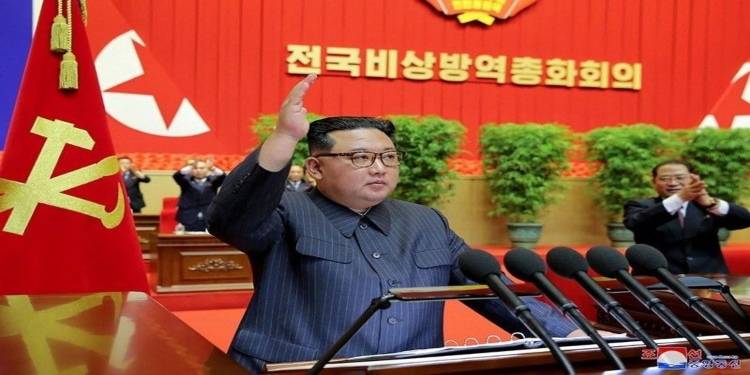
In response to North Korea's announcement of a planned satellite launch, Japan has activated its ballistic missile defenses and vowed to shoot down any projectile that threatens its territory.
The notification from North Korea revealed that the launch is scheduled to take place between May 31 and June 11. The reclusive nation claims to have completed its first military spy satellite, and leader Kim Jong Un has given his approval for the final preparations. This move marks the latest step in North Korea's ongoing series of missile launches and weapons tests, including the recent testing of a new solid-fuel intercontinental ballistic missile.
The Japanese defense ministry expects the rocket carrying the satellite to follow a trajectory over the country's southwest island chain, similar to the 2016 launch. According to analysts, this new satellite is part of North Korea's efforts to enhance its surveillance technology capabilities, which include the use of drones, aimed at improving its ability to strike targets during wartime.
In response to the potential threat, Japan's defense ministry released a statement declaring that they will take decisive action against any ballistic or other missiles that are confirmed to land in their territory. The country's defense systems, such as the Standard Missile-3 (SM-3) and Patriot Missile PAC-3, will be deployed to intercept and destroy any incoming North Korean missiles.
Japanese Prime Minister Fumio Kishida condemned North Korea's planned launch, emphasizing that it would be a serious violation of United Nations Security Council resolutions that condemn North Korea's nuclear and missile activities.
Kishida's office took to Twitter to express strong urges for North Korea to refrain from proceeding with the launch and stated that Japan would cooperate with the United States, South Korea, and other countries to collect and analyze information related to the launch.
The United States also issued a response, with a State Department spokesperson affirming that any North Korean launch using ballistic missile technology, even for satellite purposes, would violate multiple UN resolutions. The spokesperson called on North Korea to refrain from further unlawful activity and urged the country to engage in serious and sustained diplomacy.
South Korea joined the international call, describing North Korea's plan as "illegal" and warning that it would face consequences if it proceeds. The three countries—South Korea, Japan, and the United States—held a three-way telephone call to discuss coordinating a united response to North Korea's actions.
Despite the concerns and appeals from Japan and South Korea, analysts believe that there is limited leverage left to dissuade North Korea from proceeding with the launch. North Korean state media has already criticized the plans of Japan, South Korea, and the United States to share real-time data on missile launches, portraying these efforts as "sinister measures" aimed at tightening military cooperation.
The notification from North Korea revealed that the launch is scheduled to take place between May 31 and June 11. The reclusive nation claims to have completed its first military spy satellite, and leader Kim Jong Un has given his approval for the final preparations. This move marks the latest step in North Korea's ongoing series of missile launches and weapons tests, including the recent testing of a new solid-fuel intercontinental ballistic missile.
The Japanese defense ministry expects the rocket carrying the satellite to follow a trajectory over the country's southwest island chain, similar to the 2016 launch. According to analysts, this new satellite is part of North Korea's efforts to enhance its surveillance technology capabilities, which include the use of drones, aimed at improving its ability to strike targets during wartime.
In response to the potential threat, Japan's defense ministry released a statement declaring that they will take decisive action against any ballistic or other missiles that are confirmed to land in their territory. The country's defense systems, such as the Standard Missile-3 (SM-3) and Patriot Missile PAC-3, will be deployed to intercept and destroy any incoming North Korean missiles.
Japanese Prime Minister Fumio Kishida condemned North Korea's planned launch, emphasizing that it would be a serious violation of United Nations Security Council resolutions that condemn North Korea's nuclear and missile activities.
Kishida's office took to Twitter to express strong urges for North Korea to refrain from proceeding with the launch and stated that Japan would cooperate with the United States, South Korea, and other countries to collect and analyze information related to the launch.
The United States also issued a response, with a State Department spokesperson affirming that any North Korean launch using ballistic missile technology, even for satellite purposes, would violate multiple UN resolutions. The spokesperson called on North Korea to refrain from further unlawful activity and urged the country to engage in serious and sustained diplomacy.
South Korea joined the international call, describing North Korea's plan as "illegal" and warning that it would face consequences if it proceeds. The three countries—South Korea, Japan, and the United States—held a three-way telephone call to discuss coordinating a united response to North Korea's actions.
Despite the concerns and appeals from Japan and South Korea, analysts believe that there is limited leverage left to dissuade North Korea from proceeding with the launch. North Korean state media has already criticized the plans of Japan, South Korea, and the United States to share real-time data on missile launches, portraying these efforts as "sinister measures" aimed at tightening military cooperation.

